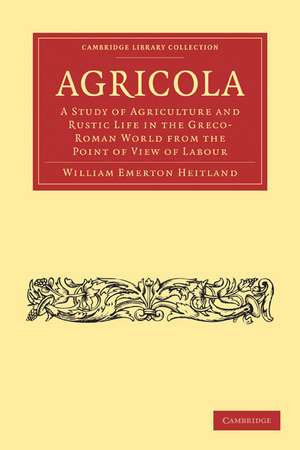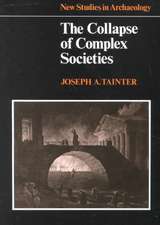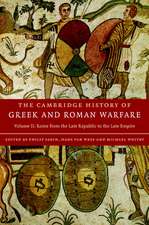Agricola: A Study of Agriculture and Rustic Life in the Greco-Roman World from the Point of View of Labour: Cambridge Library Collection - Classics
Autor William Emerton Heitlanden Limba Engleză Paperback – 29 iun 2011
Din seria Cambridge Library Collection - Classics
-
 Preț: 190.89 lei
Preț: 190.89 lei - 15%
 Preț: 406.99 lei
Preț: 406.99 lei -
 Preț: 173.84 lei
Preț: 173.84 lei - 23%
 Preț: 1994.62 lei
Preț: 1994.62 lei - 23%
 Preț: 1663.03 lei
Preț: 1663.03 lei - 23%
 Preț: 1380.34 lei
Preț: 1380.34 lei - 23%
 Preț: 1368.85 lei
Preț: 1368.85 lei -
 Preț: 342.69 lei
Preț: 342.69 lei - 5%
 Preț: 13881.42 lei
Preț: 13881.42 lei - 19%
 Preț: 544.37 lei
Preț: 544.37 lei -
 Preț: 349.59 lei
Preț: 349.59 lei - 23%
 Preț: 748.69 lei
Preț: 748.69 lei -
 Preț: 374.96 lei
Preț: 374.96 lei - 19%
 Preț: 688.41 lei
Preț: 688.41 lei - 19%
 Preț: 643.69 lei
Preț: 643.69 lei -
 Preț: 519.66 lei
Preț: 519.66 lei - 19%
 Preț: 495.90 lei
Preț: 495.90 lei -
 Preț: 368.30 lei
Preț: 368.30 lei -
 Preț: 368.30 lei
Preț: 368.30 lei -
 Preț: 367.54 lei
Preț: 367.54 lei -
 Preț: 465.21 lei
Preț: 465.21 lei -
 Preț: 531.54 lei
Preț: 531.54 lei -
 Preț: 445.49 lei
Preț: 445.49 lei -
 Preț: 281.33 lei
Preț: 281.33 lei -
 Preț: 377.01 lei
Preț: 377.01 lei -
 Preț: 367.33 lei
Preț: 367.33 lei -
 Preț: 421.20 lei
Preț: 421.20 lei -
 Preț: 282.25 lei
Preț: 282.25 lei -
 Preț: 429.94 lei
Preț: 429.94 lei -
 Preț: 465.98 lei
Preț: 465.98 lei -
 Preț: 332.07 lei
Preț: 332.07 lei -
 Preț: 367.71 lei
Preț: 367.71 lei -
 Preț: 519.83 lei
Preț: 519.83 lei -
 Preț: 518.30 lei
Preț: 518.30 lei -
 Preț: 241.66 lei
Preț: 241.66 lei
Preț: 471.16 lei
Nou
Puncte Express: 707
Preț estimativ în valută:
90.16€ • 96.41$ • 75.17£
90.16€ • 96.41$ • 75.17£
Carte tipărită la comandă
Livrare economică 17 aprilie-01 mai
Preluare comenzi: 021 569.72.76
Specificații
ISBN-13: 9781108028950
ISBN-10: 1108028950
Pagini: 508
Dimensiuni: 152 x 229 x 29 mm
Greutate: 0.74 kg
Editura: Cambridge University Press
Colecția Cambridge University Press
Seria Cambridge Library Collection - Classics
Locul publicării:Cambridge, United Kingdom
ISBN-10: 1108028950
Pagini: 508
Dimensiuni: 152 x 229 x 29 mm
Greutate: 0.74 kg
Editura: Cambridge University Press
Colecția Cambridge University Press
Seria Cambridge Library Collection - Classics
Locul publicării:Cambridge, United Kingdom
Cuprins
Preface; Introductory: 1. Evidence; 2. Land and labour; Authorities in Detail – Greek: 3. The Iliad and Odyssey; 4. Hesiod, works and days; 5. Stray notes from early poets; 6. Traces of serfdom in Greek states; 7. Herodotus; 8. The Tragedians; 9. The 'Constitution of Athens' or 'Old Oligarch'; 10. Aristophanes; 11. Thucydides; 12. Xenophon; 13. The comic fragments; 14. Early lawgivers and theorists; 15. Plato; 16. The earlier Attic orators; 17. Aristotle; 18. The later Attic orators; 19. The Macedonian period and the Leagues; Rome – Early Period to 200 B.C.: 20. The traditions combined and discussed; 21. Abstract of conclusions; Rome – Middle Period: 22. Introductory general view of period 200 BC–180 AD; 23. Cato; 24. Agriculture in the revolutionary period; 25. Varro; 26. Cicero; 27. Sallust etc; Rome – the Empire: 28. Agriculture and agricultural labour under the Roman Empire. General introduction; Rome – Augustus to Nero: 29. Horace and Vergil; 30. The Elder Seneca etc; 31. Seneca the Younger; 32. Lucan, Petronius, etc.; 33. Columella; Age of the Flavian and Antonine Emperors: 34. General introduction; 35. Musonius; 36. Pliny the Elder; 37. Tacitus; 38. Frontinus; 39. Inscriptions relative to Alimenta; 40. Dion Chrysostom; 41. New Testament writers; 42. Martial and Juvenal; 43. Pliny the Younger; 44. Suetonius etc; 45. Apuleius; Commodus to Diocletian: 46. General introduction; 47. The African inscriptions; 48. Discussion of the same; 49. The jurists of the Digest; 50. The later Colonate, its place in Roman history; From Diocletian: 51. General introduction; 52. Libanius; 53. Symmachus; 54. Ammianus; 55. Claudian; 56. Vegetius; Christian Writers: 57. Lactantius; 58. Sulpicius Severus; 59. Salvian; 60. Apollinaris Sidonius; 61. Concluding chapter; Appendix; Indices.
Descriere
A wide-ranging and detailed study of agriculture in the classical world, derived from a wide variety of sources.













